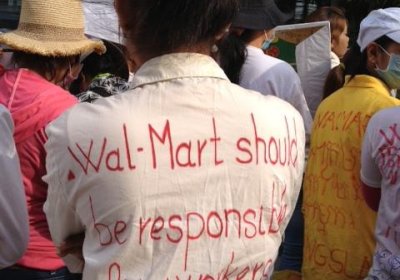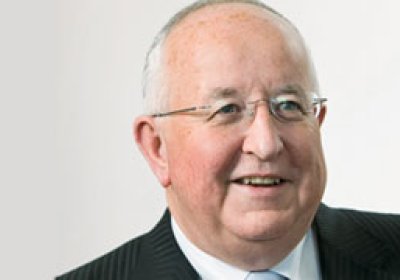In the week that US citizen Bradley Manning admitted in court that he leaked military secrets to reveal to the public the “the true costs of war”, I attended the first screening in Sydney of the documentary On The Bridge.
The screening was part of the inaugural Big Picture Festival, a social justice film festival.
Peter Boyle
Since mid-January, a group of illegally laid off Cambodian garment workers – mostly women – have been picketing the factory they worked in. Their objective was to stop the company, which closed down owing the workers, collectively, about US$200,000 of unpaid wages, from removing the equipment from the factory.
Over the past couple of weeks, Green Left Weekly has been collecting recollections, images, impressions and analyses of the biggest-ever globally coordinated anti-war protest in history: the 30 million-strong February 14-16, 2003, marches against the launching of the US-led invasion of Iraq.
It was such a tremendous explosion of popular protest that it prompted New York Times columnist Patrick Tyler to write at the time there were perhaps “two superpowers on the planet — the United States, and worldwide public opinion”.
Greens Grayndler candidate Hall Greenland: 'Markets and corporations won't de-carbonise the economy'
Hall Greenland, a respected left-wing activist, writer and journalist in Sydney, is the Greens candidate for the inner-west Sydney seat of Grayndler. Greenland was a Leichhardt councillor for the Labor Party in the 1980s, and served a second term as an independent between 1999 and 2004.
He is president of the Friends of Callan Park, a community group which has waged a long struggle against the privatisation of a vital heritage area.
Greenland is also the author of Red Hot, a biography of one of Australia’s earliest Trotskyists, Nick Origlass.
Simon Butler was a 25-year-old activist who helped organise the mass mobilisations in Sydney in February and March 2003 against the invasion of Iraq. He was also a leader of the socialist youth group Resistance and the student anti-war movement Books Not Bombs, which Resistance initiated.
Najeeba Wazefadost came to Australia as a child refugee in September 2000 by a perilous journey by boat. She is now president of Hazara Women of Australia and I interviewed her for Green Left TV at a 500-strong Hazara community demonstration in the centre of Sydney on February 20 to protest the ongoing massacres of Shia in Pakistan.
See the GLTV video and photos of the protest below.
Simon Butler was a 25-year-old activist who helped organise the mass mobilisations in Sydney in February and March 2003 against the invasion of Iraq. He was also a leader of the socialist youth group Resistance and the student anti-war movement Books Not Bombs, which Resistance initiated.
Guess who thinks the Mineral Resource Rent Tax (MRRT) is working well?
Sorry, but there's no prize if you guessed right.
“The MRRT was designed as a tax on super profits on the mining industry and importantly the tax is actually operating as it was physically designed," mining giant Rio Tinto's new chief executive Sam Walsh told AAP.
Err, yes, very well designed — for some — by a Gillard government fresh from the ALP leadership coup, with more than a little help from the biggest mining companies.
Billionaire Rupert Murdoch's propaganda machine has a penchant for using Green Left Weekly as a metaphor for left-wing opinion.
This was on the sports page of the February 4 issue of its giveaway tabloid mX: “Shane Warne played Statesman last week with his ambitious Where is Australian Cricket At? Volume 1 ... it contained more utopian fantasy than your average issue of Green Left Weekly.”
Lionel Bopage, 68, was jailed twice and tortured for his roll as a former leader of a mass liberation movement in Sri Lanka in the 1970s and 1980s, called the Janatha Vimukthi Peramuna (People's Liberation Front). He rose to the position of general secretary of the JVP but resigned from the group in 1984 over a number of differences, including his principled support for the right of national self-determination for the Tamil people. He was eventually forced into political exile together with his wife, Chitra.
Ten years ago, the February 14-16, 2003 global protests against the looming US-led invasion of Iraq involved more than 12 million people in 700 cities around the world. A million people marched around Australia — 500,000 of them in a huge protest in Sydney that was so big that most participants could not move (let along march) from Hyde Park.
It was the biggest globally coordinated protest ever — certainly the biggest global anti-war protest.
Professor Miguel Angel Nuñez is an adviser to Venezuelan President Hugo Chavez on agro-ecology. He was recently in Australia and spoke to Green Left TV about the impact of Chavez's ill health on the Venezuelan revolution, and how the international media are misrepresenting the situation. He also spoke on the role of oil in the revolution, the environmental consequences and prospects for eco-socialism in Venezuela.
- Previous page
- Page 61
- Next page











